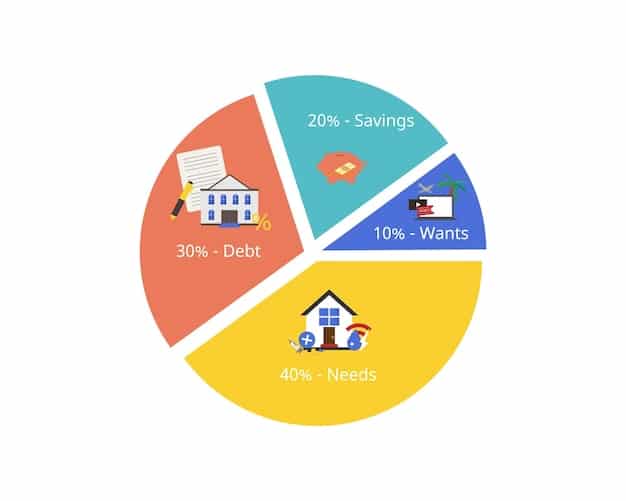Updated: Changes to Capital Gains Tax Rules for Investors in 2025

Updated: Changes to Capital Gains Tax Rules for Investors in 2025 are expected to affect how investors in Australia manage and report their capital gains, potentially influencing investment strategies and tax planning approaches.
Stay informed about the updated: changes to capital gains tax rules for investors in 2025 that could impact your investment portfolio and tax obligations in Australia. Understanding these changes is crucial for effective financial planning.
Understanding Capital Gains Tax (CGT) in Australia
Capital Gains Tax (CGT) is a tax on the profit you make when you sell an asset, such as shares or property, that has increased in value since you bought it. It’s important to understand how CGT works to effectively manage your investments and tax obligations.
What is a Capital Gain?
A capital gain is the difference between what you paid for an asset (its cost base) and what you receive when you sell it. Understanding the cost base, including purchase price and associated costs, is crucial for calculating your capital gain accurately.
Current CGT Rules in Australia
Currently, if you hold an asset for more than 12 months, you may be eligible for a 50% CGT discount. This means you only pay tax on half of the capital gain. This discount is a significant incentive for long-term investment.
- Assets held for over 12 months qualify for a 50% discount.
- CGT is only payable when you sell the asset, not while you hold it.
- Different rules apply to different types of assets, such as personal use assets.
Navigating the current CGT landscape requires careful consideration of holding periods and asset types to maximise potential discounts and minimise tax liabilities.

Anticipated Changes to CGT in 2025
As we approach 2025, there’s growing anticipation regarding potential changes to Capital Gains Tax (CGT) rules in Australia. These changes could have significant implications for investors, affecting their investment strategies and tax planning.
Possible Scenarios for CGT Reform
Several scenarios have been discussed, including reducing or eliminating the 50% CGT discount, adjusting the asset holding period required for the discount, or introducing new exemptions or concessions for certain types of investments.
Expert Opinions on Potential Impacts
Financial experts are closely monitoring these developments, offering insights into how various changes could affect different investor profiles. Some experts suggest investors may need to reassess their portfolios to mitigate potential tax liabilities.
- Reduction or elimination of the 50% CGT discount.
- Changes to the holding period required to qualify for the discount.
- New exemptions or concessions for specific investments.
Staying informed about these possible reforms is crucial for investors to prepare and adapt their strategies accordingly. Engaging with financial advisors can provide tailored guidance based on individual circumstances.
How the Changes May Affect Investors
The potential changes to Capital Gains Tax (CGT) in 2025 are expected to have a varied impact on investors in Australia. Understanding these effects is essential for making informed investment decisions and planning for the future.
Impact on Different Asset Classes
The changes could affect different asset classes, such as property, shares, and managed funds, in different ways. For example, changes to property CGT rules could influence investment decisions in the real estate market.
Strategies for Minimising CGT Liability
Investors may need to explore different strategies to minimise their CGT liability, such as tax-loss harvesting, diversifying investments, or utilising superannuation to hold assets in a tax-advantaged environment.
The potential impact on different investor profiles includes:
- High-income earners may face higher tax liabilities on capital gains.
- Retirees may need to adjust their retirement income strategies.
- Small business owners may need to reassess their business asset holdings.

Strategies for Managing CGT in 2025
Managing Capital Gains Tax (CGT) effectively is crucial for investors aiming to optimise their financial outcomes. As changes are anticipated in 2025, adopting proactive strategies can help mitigate potential tax liabilities.
Tax-Loss Harvesting
Tax-loss harvesting involves selling investments that have incurred losses to offset capital gains. This strategy can help reduce your overall CGT liability by balancing gains with losses.
Utilising Superannuation
Superannuation can be an effective tool for managing CGT. By holding assets within your superannuation fund, you can defer or potentially eliminate CGT. Contributions to superannuation are also often tax deductible up to certain limits.
- Consider transferring assets into your superannuation fund.
- Use tax-loss harvesting to offset capital gains in your portfolio.
- Diversify your investments to spread risk and minimise the impact of CGT.
Engaging a financial advisor can provide personalised strategies for managing CGT based on your specific investment portfolio and financial goals. They can help you navigate the complexities of tax laws and make informed decisions.
Seeking Professional Advice
Navigating the complexities of Capital Gains Tax (CGT) and adapting to potential changes in 2025 requires careful planning. Seeking professional advice from qualified financial advisors and tax professionals is highly recommended.
The Role of Financial Advisors
Financial advisors can provide tailored guidance based on your individual circumstances and investment goals. They can help you assess the potential impact of CGT changes on your portfolio and recommend appropriate strategies.
Engaging with Tax Professionals
Tax professionals can ensure you comply with all relevant tax laws and regulations. They can assist with calculating your CGT liability, claiming eligible deductions, and optimising your tax outcomes.
Professional advice offers several key benefits:
- Personalised strategies tailored to your financial situation.
- Expert guidance on navigating complex tax laws.
- Assistance with compliance and accurate reporting.
Investing in professional advice can help you make informed decisions and manage your CGT effectively. It can also alleviate stress and ensure you are well-prepared for any changes in tax regulations.
Staying Informed and Prepared
Staying informed about the latest updates to Capital Gains Tax (CGT) rules and being prepared for potential changes in 2025 is essential for investors in Australia. Knowledge is power when it comes to managing your investments and tax obligations.
Reliable Sources of Information
Keep an eye on updates from the Australian Taxation Office (ATO), reputable financial news outlets, and professional associations. These sources can provide accurate and timely information about CGT changes.
Regular Portfolio Reviews
Conduct regular reviews of your investment portfolio to assess your CGT exposure and identify opportunities for optimisation. This proactive approach allows you to make informed decisions and adjust your strategies as needed.
Key steps to stay informed and prepared:
- Subscribe to ATO updates and financial news alerts.
- Attend seminars and webinars on CGT management.
- Engage with financial forums and online communities.
Key Takeaways: Navigating CGT Changes in 2025
As we look towards 2025, it’s clear that understanding and preparing for potential changes to Capital Gains Tax (CGT) is crucial for Australian investors. By seeking expert advice, you can develop strategies to navigate these changes effectively.
| Key Point | Brief Description |
|---|---|
| 💰 CGT Impact | Changes in 2025 may affect how capital gains are taxed. |
| 📈 Strategies | Consider tax-loss harvesting and superannuation. |
| 👨💼 Seek Advice | Consult financial advisors and tax professionals. |
| 📰 Stay Informed | Follow ATO updates & reliable news outlets. |
Frequently Asked Questions (FAQ)
▼
Capital Gains Tax (CGT) is a tax you pay on the profit you make when you sell an asset, such as shares or property, that has increased in value.
▼
If you hold an asset for more than 12 months, you may be eligible for a 50% CGT discount, meaning you only pay tax on half of the capital gain.
▼
Strategies include tax-loss harvesting, utilising superannuation, and diversifying your investments to spread risk and minimise the impact of CGT.
▼
Professional advisors can provide tailored guidance based on your individual circumstances and investment goals. They can help you navigate complex tax laws.
▼
Reliable sources include updates from the Australian Taxation Office (ATO), reputable financial news outlets, and professional associations.
Conclusion
As we approach 2025, keeping abreast of potential changes to Capital Gains Tax and seeking professional financial advice are crucial. Being proactive, understanding your investment portfolio, and planning accordingly will help you navigate the tax implications successfully. Stay informed, stay prepared, and ensure your investments are aligned with your financial goals.





